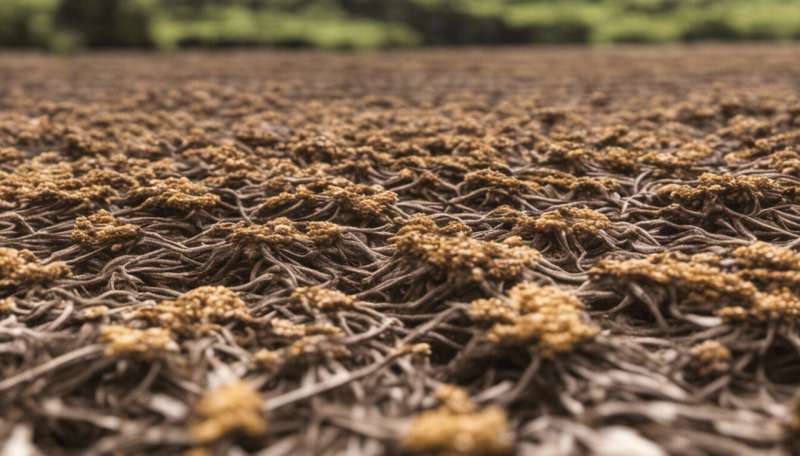UK names Gower lamb as first food with protected status under geographical indication scheme

Sheep have been grazing the salt marsh landscape of the Gower Peninsula in Wales since medieval times. Today around 3,500 lambs and ewes feed there, where a diet of naturally growing samphire and sorrel gives their meat a unique flavor.
Gower lamb, which is available to buy and eat between June and December, matures more slowly and lives longer than intensively reared lamb, which further adds to the characteristic taste.
That flavor has now been given protected status, providing the farmers of those lambs with membership of an exclusive club. Fellow members include producers of Cornish clotted cream, Melton Mowbray pork pies and champagne, which have long been part of a European scheme which means certain food and drink can only be made in certain places.
Since Brexit, the UK has established its own geographical indication scheme, which closely resembles the EU version. Gower salt marsh lamb is the first product to be added to the new British scheme and must be born, raised and slaughtered within the 19 electoral constituency boundaries that make up the Gower Peninsular. It joins 16 other Welsh products already protected including Anglesey sea salt, Welsh laverbread and Conwy mussels.
My ongoing research is looking into the the contribution to that sector of local food production which is sustainable—environmentally, socially and economically. My colleagues and I are so far finding that locally produced food contributes significantly to making sure rural areas are viable communities. And evidence shows officially recognizing and protecting the links between a food product and the area it comes can have significant benefits for that community.
In a competitive market, this protection really counts. The food and drink sector is worth £29bn to the UK economy, so standing out from the crowd has never been more important.
The protected designation of origin (PDO) awarded to Gower salt marsh lamb is reserved for products with the strongest links to the place in which they are made. There is strong evidence that such protections mean better prices for producers. For example, prices of French cheeses with a PDO are higher by an average of 11.5%.
PDOs also help to preserve traditional methods from being driven out by intensive agricultural systems by stipulating a number of requirements on the methods of production. In the Gower's case this includes recognizing the shepherding skills and knowledge of the salt marsh tidal ranges to protect the animals from dangerous rising tides. These are skills which have been developed and passed on through generations.
But it could potentially have a damaging effect on the sale of Welsh lamb from other regions, which is itself protected by a similar but less specific classification, known as a protected geographical indication (PGI).
Again, this is designed to emphasize the relationship between the specific geographic region and the name of the product. The PDO will likely be seen by consumers as a mark that Gower salt marsh lamb ranks even more highly for quality and taste against other Welsh Lamb, which could be a blow for many of Wales' other sheep farmers currently boosted by their PGI status. At the moment there is a lack of research on the differing perceptions of PDO and PGI categorisation, so we will have to wait and see if this turns out to have any significant impact.
That issue aside, geographical indicators generally work well in protecting consumers against food fraud, through an official process of audit and authentication. They are designed to avoid things like the 2013 scandal in which a number of beef products from across the EU were found to contain varying levels of horse meat.
Check meat
Products with geographical indicators are subjected to extra auditing to ensure authentic products for consumers, with controls conducted by local authority trading standards.
Compliance is monitored, and suspicion of counterfeit products can be reported directly to the enforcement body who have the power to impose fines or imprisonment under various consumer protection laws.
Geographical indicators also promote a sustainable food system by promoting localized approaches to food production. They champion and protect local and traditional production systems that limit intensification and market saturation, and promote high quality and welfare produce.
By supporting low impact practices GIs provide greater stability for those working in the industry, protecting traditional skills and maintaining viable rural livelihoods by placing requirements on production processes
Asked about the importance of designation for its Anglesey Sea Salt (protected by a PDO since 2014) Halen Mon director Alison Wilson told me it was one of the company's "proudest achievments." She added: "It gives protection when it's needed, and status and proof of the particular qualities of our hand-harvested sea salt. It means that we are the only British sea salt to be audited and proved 100% authentic, in a world full of food fraud."
As dietary habits continue to change, many people are looking to reduce the impact of their diet on the environment. The new status for Gower salt marsh lamb will hopefully give consumers reassurance that they are eating a high welfare, pasture fed animal, which has had a minimal environmental impact over its life. A protected product can help protect the planet.
Provided by The Conversation
This article is republished from The Conversation under a Creative Commons license. Read the original article.![]()




















